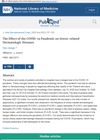 125 citations,
September 2001 in “The FASEB Journal”
125 citations,
September 2001 in “The FASEB Journal” Stress can cause hair loss by negatively affecting hair follicles and this effect might be reversed with specific treatments.
 40 citations,
November 2011 in “American Journal of Human Biology”
40 citations,
November 2011 in “American Journal of Human Biology” Stress from being transgender is linked to higher blood pressure at night and more inflammation, which may affect heart health.
[object Object] January 2021 in “International Journal of Research in Medical Sciences” During the COVID-19 lockdown, there were fewer cases of mild skin issues and more cases of stress-related skin conditions.
Hair proteins in preschool children and their mothers could indicate developmental changes and health status.
 November 2022 in “Journal of Investigative Dermatology”
November 2022 in “Journal of Investigative Dermatology” Aging skin cells change their lipid profiles due to stress, affecting skin health.
2 citations,
January 2018 in “Elsevier eBooks” Probiotics and dietary changes can help treat acne.
 November 2020 in “Holistic Nursing Practice”
November 2020 in “Holistic Nursing Practice” COVID-19 can cause hair loss, loss of taste and smell, skin changes, and eye problems.
2 citations,
February 2021 in “Developmental Cell” Middle-aged skin shows aging signs, and quercetin might help delay them.
 20 citations,
May 2020 in “Experimental Dermatology”
20 citations,
May 2020 in “Experimental Dermatology” Aging scalp skin contributes to hair aging and loss, and more research is needed to develop better hair loss treatments.
 8 citations,
June 2021 in “Frontiers in Bioengineering and Biotechnology”
8 citations,
June 2021 in “Frontiers in Bioengineering and Biotechnology” Extracts from Alnus sibirica and oregonin may help with hair growth and prevent hair loss.
 March 2023 in “International Journal of Biomedicine”
March 2023 in “International Journal of Biomedicine” Hair loss from Telogen Effluvium can be managed by treating the underlying cause and may improve with treatments like minoxidil.
 16 citations,
December 2018 in “Plant Science”
16 citations,
December 2018 in “Plant Science” Elevated CO2 can lessen the negative impact of water shortage on soybean roots and affects specific genes.
 1 citations,
December 2011
1 citations,
December 2011 Marine-derived ingredients show potential for hair health but need more human trials to confirm effectiveness.
 5 citations,
October 1984 in “The BMJ”
5 citations,
October 1984 in “The BMJ” Up to 50% of scalp hair can be lost before it appears thin, and treatment is only needed for hair loss caused by diseases or deficiencies.
 122 citations,
April 1995 in “Journal of Cutaneous Pathology”
122 citations,
April 1995 in “Journal of Cutaneous Pathology” The document describes how to tell different types of non-scarring hair loss apart by looking at hair and scalp tissue under a microscope.
 6 citations,
March 1999 in “Seminars in Cutaneous Medicine and Surgery”
6 citations,
March 1999 in “Seminars in Cutaneous Medicine and Surgery” Scalp biopsies are essential for accurately diagnosing alopecia areata.

Stress significantly contributes to hair loss, especially in women and those aged 31-40.
 14 citations,
December 2020 in “Journal of Investigative Dermatology”
14 citations,
December 2020 in “Journal of Investigative Dermatology” Aging causes changes in the scalp that can affect hair growth and lead to older-looking hair in women.
 30 citations,
July 2017 in “BioEssays”
30 citations,
July 2017 in “BioEssays” Activating NRF2 might help treat hair disorders by improving antioxidant defenses.
 1 citations,
May 2017 in “Asian journal of medical sciences”
1 citations,
May 2017 in “Asian journal of medical sciences” The dietary supplement significantly improved skin, nails, and hair in older adults.
 6 citations,
April 2019 in “Journal of Cosmetic Dermatology”
6 citations,
April 2019 in “Journal of Cosmetic Dermatology” Hair loss affects women's self-esteem; treatments like minoxidil can help.
[object Object]  24 citations,
May 2015 in “Schizophrenia Research”
24 citations,
May 2015 in “Schizophrenia Research” A drug improved schizophrenia-like symptoms in stressed rats by changing brain steroid levels.
 3 citations,
September 2022 in “Frontiers in psychiatry”
3 citations,
September 2022 in “Frontiers in psychiatry” University students in Egypt experienced high stress during COVID-19's third wave, with negative coping mechanisms being more common.
 August 2022 in “Revista de la Universidad Industrial de Santander/Salud UIS”
August 2022 in “Revista de la Universidad Industrial de Santander/Salud UIS” Stress-related hair loss was reversed with a special medication.
 4 citations,
February 2022 in “Frontiers in molecular biosciences”
4 citations,
February 2022 in “Frontiers in molecular biosciences” Chronic stress in mice changes skin metabolism and gene expression, leading to hair loss.
 6 citations,
May 2022 in “Frontiers in Medicine”
6 citations,
May 2022 in “Frontiers in Medicine” The study suggests pandemic stress might worsen or trigger hair loss problems.
 November 2022 in “PubMed”
November 2022 in “PubMed” The COVID-19 pandemic increased some stress-related skin diseases but didn't affect others.
 194 citations,
March 2003 in “American Journal of Pathology”
194 citations,
March 2003 in “American Journal of Pathology” Stress stops hair growth in mice by causing early hair growth phase end and harmful inflammation through a specific nerve-related pathway.
 6 citations,
December 2019 in “BMC Complementary and Alternative Medicine”
6 citations,
December 2019 in “BMC Complementary and Alternative Medicine” Alcohol extract from Vernonia anthelmintica seeds may help treat stress-related hair loss.
 20 citations,
January 2015 in “Current problems in dermatology”
20 citations,
January 2015 in “Current problems in dermatology” Graying hair happens due to aging and might be delayed by new treatments.

























